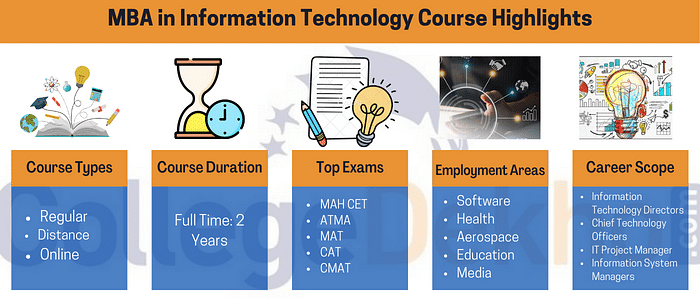MBA in IT
MBA in IT Overview
MBA in Information Technology or MBA in IT is a two-year course best suitable for candidates who want to learn about business and information systems and combine business strategies with contemporary ideas of information security, project management, and telecommunications. MBA in Information Technology syllabus provides business owners and executives with in-depth knowledge of human resource management, e-commerce, and security. A professional with an MBA degree has the upper hand in today's harsh and competitive corporate world. This post-graduate degree provides a conceptual perspective and prepares a company to adapt to technological changes.
Along with a heavy emphasis on IT, MBA in Information Technology course provides students with a firm foundation in managerial skills, which are essential for running a business. It is not unexpected that professional degrees in information technology are already available. MBA in Information Technology students are prepared to tackle and manage their businesses not only via the offline stage but also on the online stage. There are currently various choices for persons with the necessary degree and training who want to pursue a career in this industry.
Admission to the MBA in IT in India is based on merit and the outcomes of entrance exams. A bachelor's degree in a suitable field of study is required, as are admission exam scores such as the CAT/XAT/GMAT/MAH CET/ATMA/NMAT/MAT and others, as well as any other key qualification prerequisites specified by the university. MBA in Information Technology programmes are offered by the Department of Management Studies at IIT Delhi, IIM Lucknow, IIT Madras, IIM Raipur, S.P. Jain Institute of Management and Research, and other notable management colleges in India.
The course fee for this programme ranges from INR 25,000 to INR 15,00,000 (and sometimes even more) depending on the institution where the candidate enrolls. MBA in Information Technology graduates are placed in a range of positions. Some examples include Project Manager, Business Development Manager/Executive, Marketing Manager, Corporate Strategy Manager, Analytics Manager, System Manager, and so on. Check complete information about MBA in Information Technology on this page.
Table of Contents
- MBA in IT Overview
- MBA in IT Highlights
- Why Study MBA in Information Technology?
- Types of MBA in Information Technology Courses
- MBA in IT Syllabus
- MBA in IT Syllabus for Different Subjects
- MBA in Information Technology Eligibility Criteria
- MBA in Information Technology Entrance Exams
- MBA in Information Technology Admission Process
- Top MBA IT Colleges in India
- MBA in Information Technology Course Fees
- Top MBA in Information Technology Colleges Abroad
- MBA in Information Technology Scope in India
- MBA in IT Career Options and Job Prospects
- MBA in Information Technology Salary
- Top MBA in Information Technology Recruiters
- Skills Required for MBA in IT
- FAQs about MBA IT
MBA in IT Highlights
Check out the significant highlights of the MBA in Information Technology courses in the table below:

| Particulars | Details |
|---|---|
| Name of the Course | MBA in Information Technology or MBA in IT |
| Level | Postgraduate |
| Types | Full-Time, Distance/Online |
| Duration | 2 years |
| Exam Type | Semester |
| Minimum Qualification Requirement | Bachelor’s Degree in Relevant Field of Study |
| Average Initial Salary Range | INR 10 to 20 Lakh Per Annum |
| Selection Process | Entrance Exam followed by Group Discussion and Personal Interview |
| Popular Entrance Exams | MAH CET, ATMA, MAT, CAT, CMAT, XAT, etc. |
| Top Employment Areas | Software, Health, Aerospace, Education, Media, etc. |
| Minimum Aggregate Required | 50% (Average) |
| Major Recruiters | Tata Consultancy Services, Accenture, Infosys, Wipro, IBM, etc. |
| Top Colleges in India | IIM Bangalore, MDI Gurgaon, NMIMS Mumbai, IIM Ahmedabad, IIIM Calcutta, KIIT University, etc. |
Why Study MBA in Information Technology?
The study and application of computers and any type of telecommunications that store, retrieve, study, transmit, alter data, and transfer information is referred to as information technology (IT). It is a combination of hardware and software that is used to conduct the essential functions that people require and use on a daily basis. The implementation of Information Technology is quite important in business. It assists every business sector in automating its processes and systems in order to achieve goals, generate income, and minimize inefficiency in their job. MBA in Information Technology is becoming increasingly valuable in areas such as commercial transactions, meeting client requests, and meeting regulatory standards.
The goal of getting an MBA in Information Technology degree is to meet the ever-increasing needs of industries as well as the ever-increasing expectations of customers in every field. Employers look to sound business information technology to maintain the balance between complicated computer systems and proper business procedures. MBA in Information Technology supports businesses through a hardware system, software system, and all changes in procedures. Serving clients will become much easier with effective technology management since it increases staff engagement, provides access to information, and provides flexibility in responding to business difficulties.
Types of MBA in Information Technology Courses
MBA degrees, like any other master's degree, are available in a variety of formats, including full-time and online degrees that may be completed from the comfort of one's own home. Each MBA in Information Technology programme provides the opportunity to gain a comprehensive understanding of the business and Retail Management fields of study; but, which programme should a person pursue? The following is a list of some of the many MBA in Information Technology programmes available.
Two-Year Full-Time MBA in Information Technology
One of the most prevalent MBA programmes is a two-year full-time MBA programme. Enrolling in a two-year MBA in Information Technology programme allows students to hone their essential business skills while delving into specialised subjects. The first year will cover fundamental topics like strategy, communication, finance, and marketing. During elective modules and focus periods in year two, students will also be allowed to focus on the specialisation of their choice. They will also have the opportunity to participate in a summer internship, which may lead to a full-time employment offer following graduation.
Part-Time MBA in Information Technology
For people who want to study for an MBA but do not want to spend time away from their job, a part-time MBA in Information Technology may be the ideal alternative. Part-time MBA programmes enable working professionals to design a curriculum that fits their schedules. Degrees are often earned over a long period of time, ranging from 2 to 5 years or more. To earn the degree, candidates can enrol in MBA in Information Technology with a weekly schedule of evening or weekend classes.
Online MBA in Information Technology
Online MBA programmes allow students to earn degrees from the comfort of their own homes, anywhere in the world. Online MBA in Information Technology programmes will cover the same topics and be taught by the same professors as traditional MBA programmes. They do, however, add the advantage of a flexible learning environment. Similar to a part-time programme, students can finish lessons at their leisure and study for an extended period of time.
Executive MBA in Information Technology
Executive MBA programmes are designed for mid-career professionals who want to advance into positions of leadership. Applicants must have at least 5 years of work experience because the MBA in Information Technology programmes place a high value on the experience that each student brings. Part-time EMBA programmes typically take place in the evenings or on weekends. This allows trainees to continue working while putting their knowledge and skills to use in their business as they grow.
MBA in IT Syllabus
Check the syllabus for MBA in Information Technology course provided in the tables below.
First Year MBA in Information Technology Syllabus
| Management Process and Organisational Behaviour | Managerial Skills Development (NUES) |
|---|---|
| Managerial Economics | Financial and Management Accounting |
| Database Management and Administration (DBMA) | Quantitative Techniques for Decision Making |
| Management of Technology Innovation and Change | Practical- DBMA Lab |
| Business Research | Business System Analysis and Design |
| Financial Management | Human Resource Management |
| Marketing Management | Production and Operations Management |
| Business and Legal Environment | Practical- ERP (Basic Function Area) Lab |
Second Year MBA in Information Technology Syllabus
| ERP- Advanced Business Application Programming | Software Project Management |
|---|---|
| E-Governance and Framework of ICT | Information System Management |
| Summer Training Project | Electives 1 (Semester 3) |
| Electives 2 (Semester 3) | Electives 3 (Semester 3) |
| Entrepreneurship Development | ERP- System Administration |
| Corporate Social Responsibility, Ethics, and Human Values | Dissertation |
| E-Business | Electives 1 (Semester 4) |
| Electives 2 (Semester 4) | Practical |
List of Electives for Second Year MBA in Information Technology
| Data Centre Management | Network Application and Management |
|---|---|
| Knowledge Management | Web Technologies |
| E- Customer Relationship Management | Information Security |
| Business Intelligence and Applications | E- Supply Chain and Management |
| Cloud Computing | Software Quality Assurance |
| E-Business Financial Modeling |
MBA in IT Syllabus for Different Subjects
Check the table below to gain a detailed insight into the MBA in Information Technology syllabus for main subjects.
| Subject | Description | Syllabus |
|---|---|---|
| Organizational Behaviour | Organizational behaviour is the academic study of how people behave in groups, and its ideas are mostly used to improve how businesses operate. The basis of corporate human resources is the study of organizational behaviour, which encompasses fields of study devoted to enhancing productivity at work, improving satisfaction with employment, fostering innovation, and supporting leadership. |
|
| Financial Accounting | The process of documenting, compiling, and reporting the numerous transactions occurring from business activities over a given period of time is known as financial accounting. The creation of financial statements, such as the balance sheet, income statement, and cash flow statement, which document a company's operating performance over a given time period, summarizes these transactions. |
|
| Business Communication | Information must be shared both inside and outside of an organization in order for business communication to be effective. This style of communication encourages engagement between staff and management to accomplish shared objectives while simplifying organizational processes and reducing mistakes. |
|
| Human Resource Management | Planning, organizing, directing, and controlling are among the management functions that are covered under human resource management. It covers the acquisition of human resources, their training and development, and their maintenance. It aids in the accomplishment of personal, professional, and community objectives. It encompasses the study of sociology, psychology, economics, communication, and management. It also covers encouraging teamwork and team spirit. |
|
| Marketing Management | Management of marketing activities and the individuals who participate in them, including managers, marketing management professionals, contractors, and others, is referred to as marketing management. Setting goals, creating marketing strategies, carrying out market research, creating marketing campaigns, and determining a company's target market are all examples of pertinent activities. |
|
MBA in Information Technology Eligibility Criteria
In India, the eligibility criteria for an MBA in Information Technology differs from one college of management to another. Hence, it is advisable that students must thoroughly review the overall eligibility criteria and documents required for admission by visiting the official website of their desired college or institution. The following pointers represent a common eligibility criterion for MBA IT:
- Applicants must sit for university-level exams like MAH CET, ATMA, MAT, CAT, CMAT, XAT, etc.
- Applicants must hold a bachelor's degree in any relevant field from a recognized institution with a minimum of 50% aggregate. However, renowned institutions like IIMs and IITs require students to have a minimum aggregate of 60% or above.
- Applicants must have a cumulative grade point average (CGPA) of at least 60% in classes 10th and 12th.
- Though not mandatory, certain institutions may also require applicants to have two years of previous work experience in the relevant field.
- The majority of MBA universities allow final-year candidates who can provide a provisional degree from their previous institution to apply for MBA in Information Technology admissions.
MBA in Information Technology Entrance Exams
As previously indicated, applicants' postgraduate degrees, as well as the results of entrance tests, influence admission to MBA in Information Technology PG programmes. The following are some of the most common admission tests for applicants intending to pursue an MBA in Information Technology degree in India:
MBA in Information Technology Admission Process
The majority of universities provide an MBA in Information Technology in two years, divided into four semesters. If you want to get the most up-to-date degree, you should start by looking for the best MBA colleges in India. For those interested in studying this programme in India, the following is a simplified step-by-step admission process:
Step 1: Select an MBA College
There are various colleges in India that provide MBA degrees with a specialisation in information technology. Candidates interested in applying for admission must first choose a B-School. This may look straightforward, yet most toppers admit that selecting a B-School is one of the most difficult components of the MBA admissions process. A B-School selection may be influenced by things such as:
- Location of the B-School
- Reputation
- Specializations Offered
- Selection Procedure
- Fee Structure
- Return on Investment i.e. Placements Record etc
Step 2: Take/Appear in Any of the MBA Entrance Exams
Those interested in pursuing a management course PGDM/MBA programme with a specialisation in Information Technology from top MBA colleges must take the CAT, XAT, GMAT, CMAT, NMAT, or any equivalent entrance test authorised by colleges and business schools in India offering MBA in Information Technology. Once candidates have picked which B-School they wish to attend, they can check the detailed entry tests for the two-year MBA programme stated below:
- National Level Entrance Exam
- State-Level Entrance Exam
- University Level Entrance Exam
Step 3: Check the Eligibility Criteria
After deciding on a B-School and entrance examinations, one of the most important components of the MBA admission process 2023 for candidates is determining their eligibility for admission to the selected institute. Candidates can select between a full-time MBA in Information Technology and a part-time MBA in Information Technology. Except for a few B-Schools that provide speciality courses, all B-Schools share the same core MBA eligibility criteria.
Step 4: Attend the MBA Course Selection
Fill out the application form, take the test after you've confirmed your eligibility, and then participate in the selection process after the results are revealed. In 2023, the most typical MBA in Information Technology admissions process at most B-Schools will be:
- WAT/GD: Candidates must take a written ability test or engage in a group discussion after passing the MBA entrance tests, such as the Common Admission Test or another exam. In this round, basic business-related questions are asked to measure a candidate's skills.
- PI: The personal interview is used to evaluate the candidate's interpersonal skills.
Note: To gain admission, the candidate must understand how to pass the GD-PI round. Most B-schools in India will hold their selection rounds between March and April.
Step 5: Payment of MBA IT Course Fees
All B-Schools create a final list of candidates who have been shortlisted and qualified to move on to the next round. In general, the merit list is determined based on entrance exam scores, the candidate's academic profile, work experience (if any), gender diversity, and other factors. Following final selection, candidates must attend the counselling phase, during which fee payment secures a fixed seat at the B-School. MBA in Information Technology course fees may vary from institution to college.
Documents Required For MBA in Information Technology Admission
- HSC Certificate and Mark sheet
- Graduation All Certificates and Mark sheets
- College Leaving Certificate
- Migration Certificate for students migrating from another university
- Provisional Certificate
- Recent passport-size colour photographs duly attested by a Gazetted Officer
- Caste/Tribe certificate (for SC/ST candidate)/Physically Handicapped certificate
Top MBA IT Colleges in India
Following is a list of some of India's most well-known and reputable colleges that provide MBA in Information Technology programmes to students:
| Name of the College/Institute | Location |
|---|---|
| Department of Management Studies, IIT Delhi | Delhi |
| IIM Lucknow - Indian Institute of Management | Lucknow |
| DoMS IIT Madras - Department of Management Studies | Chennai |
| Jaipuria Jaipur - Jaipuria Institute of Management | Jaipur |
| IIM Raipur - Indian Institute of Management | Raipur |
| S.P. Jain Institute of Management and Research | Mumbai |
| Jamia Millia Islamia [JMI] | New Delhi |
| IIM Kashipur - Indian Institute of Management | Kashipur |
| LPU - Lovely Professional University | Jalandhar |
| Great Lakes Institute of Management | Chennai |
| National Insurance Academy- NIA | Pune |
| CMS Business School, Jain Deemed-to-be University | Bangalore |
| GIM - Goa Institute of Management | Goa |
| IMT Ghaziabad - Institute of Management Technology | Ghaziabad |
| ICFAI Business School (IBS) | Hyderabad |
| LM Thapar School of Management | Mohali |
| FORE School of Management | Delhi |
| Guru Gobind Singh Indraprastha University | Delhi |
| VIT Business School, Vellore Institute of Technology | Vellore |
| Christ University | Bangalore |
MBA in Information Technology Course Fees
MBA in Information Technology course fees in India are decided by a number of factors, including the type of university (public or private), the duration of the programme, location, course content, rating, reputation/goodwill, and others. The anticipated yearly average fees for MBA in Information Technology programmes at several of India's most famous B-Schools are shown in the table below:
| Name of the College/Institute | Average Course Fees |
|---|---|
| Department of Management Studies, IIT Delhi | INR 10.4 lakhs |
| IIM Lucknow - Indian Institute of Management | INR 12.6 lakhs |
| DoMS IIT Madras - Department of Management Studies | INR 9.14 lakhs |
| Jaipuria Jaipur - Jaipuria Institute of Management | INR 10 lakhs |
| IIM Raipur - Indian Institute of Management | INR 14.19 lakhs |
| S.P. Jain Institute of Management and Research | INR 20.42 lakhs |
| Jamia Millia Islamia [JMI] | INR 47,000 |
| IIM Kashipur - Indian Institute of Management | INR 14.88 lakhs |
| LPU - Lovely Professional University | INR 7.6 - 9.6 lakhs |
| Great Lakes Institute of Management | INR 17.25 lakhs |
| National Insurance Academy- NIA | INR 9.43 lakhs |
| CMS Business School, Jain Deemed-to-be University | INR 10.75 lakhs |
| GIM - Goa Institute of Management | INR 18.31 lakhs |
| IMT Ghaziabad - Institute of Management Technology | INR 18.8 lakhs |
| ICFAI Business School (IBS) | INR 16.02 lakhs |
| LM Thapar School of Management | INR 8.02 lakhs |
| FORE School of Management | INR 16.98 lakhs |
| Guru Gobind Singh Indraprastha University | INR 2 lakhs |
| VIT Business School, Vellore Institute of Technology | INR 6.97 lakhs |
| Christ University | INR 22.23 - 24.15 lakhs |
Top MBA in Information Technology Colleges Abroad
Enlisted below are some of the world-class universities from different parts of the world that are providing MBA in Information Technology degrees:
| Name of the University/College | Location |
|---|---|
| NYU Stern School of Business, New York University | United States |
| UCLA University of California, Los Angeles - Anderson School of Management | United States |
| Stanford University - Stanford Graduate School of Business | United States |
| University of California, Berkeley - Haas School of Business | United States |
| Kelley School of Business, Indiana University Bloomington | United States |
| Coventry University - Coventry Business School | United Kingdom |
| University of Bedfordshire Business School | United Kingdom |
| University of Salford Manchester - Salford Business School | United Kingdom |
| York University - Schulich School of Business | Canada |
| University of New Brunswick | Canada |
| University of New South Wales (UNSW) - Australian Graduate School of Management (AGSM) | Australia |
| Deakin University - Deakin Business School | Australia |
| University of Technology, Sydney (UTS) - Graduate School of Business | Australia |
| Edith Cowan University (ECU) - Perth Graduate School of Business | Australia |
| Charles Sturt University | Australia |
| University of Newcastle | Australia |
| ESMT Berlin | Germany |
| TUM Technische Universität München | Germany |
| Hochschule Furtwangen University | Germany |
| IU International University of Applied Sciences | Germany |
| Aachen University - RWTH Business School | Germany |
MBA in Information Technology Scope in India
MBA in Information Technology has become a favorite choice for aspirants and students, as it opens the doors to success. IT's popularity stems from its ability to improve the lives of ordinary people. Information technology, a byword for smart living, has been the primary catalyst in making mankind's lifestyle simpler, smoother, and easier. A guy with information can move the wheels of fortune in today's world. Furthermore, IT tests an individual's skills and motivates them to come up with ideas that can change the framework of human life.
MBA in Information Technology provides students with a successful future while wearing triumph on their sleeves. IT, the uncontested monarch of the engineering sector, is expanding exponentially with each passing year. However, there is no denying that this stream is not without difficulties. Surprisingly, it has triumphed in trampling all problems and has maintained its dominance in the sector. Nonetheless, one cannot choose this industry without first studying more about the future prospects of MBA in Information Technology, as disregarding the reality simply leads to a pool of irreparable career blows that leave long-lasting injuries.
MBA in IT Career Options and Job Prospects
An MBA in Information Technology comprises the study of the fundamentals as well as the functional areas of both Information Technology and Management. Hence, the career prospects that open after completing MBA in Information Technology are immense. Candidates can find a job in several sectors after having attained an MBA in Information Technology degree. They can venture into the sectors of IT Configuration Management, IT Governance Areas, IT Financial Management Areas, Service Management Areas, etc. The package of IT specialists who have an MBA degree is quite profitable
IT Managers have numerous options to work in the IT department of any large corporation or directly in technology startups. TCS, Infosys, WIPRO, Tech Mahindra, HCL Technologies, and other Indian IT behemoths hire MBA in Information Technology from top Indian B Schools for business development roles and pay an appealing entry-level wage. MBA in Information Technology graduates are assigned to a range of job prospects. Some of the jobs available after getting an MBA IT degree are given below.
| Job Profile | Job Description |
|---|---|
| Chief Technology Officer | CTOs are in charge of their company's technological development. They identify business dangers and possibilities. These opportunities are available at companies that work in sectors such as artificial intelligence, the Internet of Things, and cyber security, among others. This role is best suited for someone who can control the complete information technology department and directly manage senior managers within the company's IT division. |
| Chief Information Officer | The chief information officer (CIO) is the company leader in charge of the management, implementation, and usability of information and computer technologies that support enterprise goals. With the rising usage of IT and computer technology in enterprises, the number of CIOs has increased dramatically. This position is suited for graduates in business administration and information technology. |
| Project Manager | A project manager's job is to plan, budget, supervise, and document all parts of a certain project. In an organization, a project manager is in charge of the timeline and budget of a project. They may collaborate closely with higher management to ensure that the scope and direction of each project remain on track, as well as with other departments for assistance. |
| Program Manager | A programme manager is in charge of delivering a program's output/product. He or she gives strategic direction to teams and project managers in ways that enhance the company's culture. This position is suited for people who can oversee the progress of operations and establish effective strategies and methods. |
| IT Director | The IT Director's responsibilities include monitoring technical operations infrastructure, tracking technology as well as the IT team to achieve goals, meet quotas, eliminate security concerns, boost user happiness, and maintain operations and systems. |
MBA in Information Technology Salary
As a hub of many IT MNCs, India is one of the greatest countries for MBA Information Technology graduates and professionals, with numerous career opportunities in cities such as Bangalore, Chennai, Hyderabad, Pune, Noida, and Gurugram. A rookie/fresher can expect to make INR 5-10 lakhs per year, while someone with suitable experience (minimum of 5 years) can expect to earn INR 10-30 lakhs per year.
Salary increases in this area are 6% or higher each year, and opportunities in the industry are predicted to expand at the same rate as the industry grows at a rate of roughly 15% per year. Check the table below to know the job positions and the annual salary associated with them after pursuing an MBA in Information Technology.
| Job Profile | Annual Salary |
|---|---|
| IT Director | INR 34 LPA |
| Business Development Manager | INR 5.70 LPA - INR 16 LPA |
| Marketing Manager | INR 7 LPA - INR 22.40 LPA |
| Corporate Strategy Manager | INR 16.63 LPA |
| Chief Technology Officer | INR 25 LPA |
| Chief Information Officer | INR 20 LPA |
| Programme Manager | INR 19 LPA |
| System Manager | INR 5.70 LPA - INR 18.40 LPA |
| Data Processing Manager | INR 12 LPA |
| Project Manager | INR 18 LPA |
Top MBA in Information Technology Recruiters
MBA in Information Technology graduates can find work in various IT management fields such as IT Governance, IT Financial Management, IT Service Management, and IT Configuration Management. MBA in Information Technology professionals can also pursue careers in defense, space agencies, and the automobile industry. Here are some of the top companies recruiting MBA in Information Technology graduates with great packages.
| Government Organizations | Indian Companies | Foreign Companies |
|---|---|---|
|
|
|
Skills Required for MBA in IT
When pursuing MBA in IT, a student need not only have skills related to business management but information technology too. Considering the technological advancements that happen every day, one needs to be updated with all the latest software and every other thing. If you are thinking about enrolling in MBA in Information Technology, then get ready to equip yourself with the following skills:
- Decision-Making Skills
- Awareness of the Market and Products
- Communication Skills
- Time Management
- Strategic Mindset
- Leadership Skills
- Managerial Skills
- Observation Skills
- Analytical and Critical Thinking Skills
- Interest in Business and Management
FAQs about MBA IT
What is the difference between Data Science vs Data Analytics?
Data science is a broad umbrella term that includes data analytics, data mining, machine learning, and several other disciplines. Data analysts extract useful insights from numerous data sources, whereas data scientists are expected to foresee the future based on historical patterns. A data scientist generates questions, whereas a data analyst answers pre-existing queries.
What are the eligibility criteria for MBA in Information Technology?
The following are the eligibility criteria for an MBA in Information Technology:
- Applicants must sit for university-level exams like MAH CET, ATMA, MAT, CAT, CMAT, XAT, etc.
- Applicants must hold a bachelor's degree in any relevant field from a recognised institution with a minimum of 50% aggregate and a CGPA of at least 60% in classes 10th and 12th, etc.
What are the benefits of studying MBA in Information Technology?
There are numerous benefits of studying MBA in Information Technology. The future of the IT industry would benefit greatly from an MBA in IT. Students with this degree will be able to submit applications for positions in the banking and finance sectors, as well as any other industry where they are eligible to do so.
What are the major areas of recruitment for an MBA in Information Technology?
Many MBA IT courses include an international immersion experience that enables students in understanding international commerce and culture. The following are the major areas of recruitment for an MBA in Information Technology:
- Software
- Media
- Multinational companies
- Health
- Education
- Banking
- Aerospace
What are the best reference books for MBA in Information Technology?
There are many best reference books for an MBA in Information Technology available for students to broaden their understanding of the field. The following are some of them:
- ABAP Objects by author DR Horst Keller
- SAP System Administration by author Lian Will
- Software Engineering by authors Aggarwal, K K Singh, Yogesh
Are projects compulsory in MBA in Information Technology courses?
Yes, projects are compulsory in MBA in Information Technology courses for all students at the end of their final year. Some popular marketing project topics for this course include:
- Customer Reporting and Service Tools
- Design and Development of Training Information System
- Design of eLearning System
- Development of the HRM System
- Secure Online Survey System
Which teaching methodologies and techniques are used in MBA in Information Technology courses?
Innovative and effective teaching methodologies and techniques are used in MBA in Information Technology courses to maximise the persuasiveness of teaching. The research, case method, stimulation, group-based, internship, and projects are some of the methods used in addition to conventional lecture-based learning.
Are there any elective subjects for MBA in Information Technology?
Yes, there are elective subjects for MBA in Information Technology that students can choose as per their interests. The following are the elective subjects for this course:
- Cloud Computing
- E-Supply Chain Management
- Information Security
- Network Application
- Software Quality Assurance
- Web Technologies
What are the skills required for MBA in Information Technology?
Skills required for MBA in Information Technology are both soft and hard skills. Learning business skills and enrolling in a management course will help you succeed in your desired career since both of these skills are important. Some of the skills required in this field are:
- Communication skills
- Interpersonal skills
- Leadership skills
- Problem-solving skills
- Technical skills
- Time Management and organisation skills
Can MBA in Information Technology fetch students a rewarding career?
Yes, MBA in Information Technology can fetch students a rewarding career since the field has proven to be an excellent degree to ascend the managerial ladder and attract lucrative career opportunities at managerial positions. Moreover, it is fortunate that MBA IT courses can also help in preparing students for a range of non-managerial roles like Data Analyst.
What is MBA in Information Technology?
MBA in Information Technology is a two-year postgraduate course that teaches students about overseeing computer systems and information technology. IT managers oversee and assess processes involving electronic data and IT. The efficient operation of computer systems is the responsibility and accountability of information technology managers. They have enhanced abilities and an in-depth understanding of the sector.
What are the subjects for MBA in Information Technology?
The following are the various subjects taught during an MBA in Information Technology course:
- Business System Analysis and Design
- Database Management and Administration
- ERP - System Administration
- Financial Management
- Information System Management
- Management Process
- Marketing Management
What are the top colleges for MBA in Information Technology abroad?
There are many top colleges for MBA in Information Technology abroad. Some of them include the following:
- Florida Institute of Technology
- James Cook University
- Neu-Ulm (HNU)
- Schiller International University
- University of Applied Sciences
- University of New Brunswick
- University of North Texas
- University of Wisconsin-Milwaukee
- Virginia Commonwealth University
Can I study MBA in Information Technology abroad?
Yes, you can study MBA in Information Technology abroad. Thousands of students choose to pursue computing degrees abroad every year, making MBA IT one of the most sought-after courses for international students. With almost all organisations in need of skilled IT professionals, it is an exciting subject that gives graduates a variety of rewarding career choices.
Is a distance/online MBA in Information Technology available?
Yes, a distance/online MBA in Information Technology is available for candidates who are unable to attend full-time regular or on-campus classes. A few colleges or institutions in India like Birla Institute of Management Technology (BIMTECH), Sathyabama University, NMIMS Mumbai, Dr D Y Patil Vidyapeeth, etc. offer distance/online courses.
How to apply for MBA in Information Technology courses?
Candidates may apply for MBA in Information Technology courses either offline or online after they have obtained their entrance exam score reports. After this, the criteria for selection are based on the cumulative scores obtained in the entrance exam, the personal interview/group discussion, and academic performance.
How to get admission to MBA in Information Technology courses?
Students can get admission to MBA in Information Technology courses only after they have passed entrance exams like the MAH CET, ATMA, MAT, CAT, CMAT, XAT, etc., and have roughly scored an 80 to 95 cutoff percentile. However, many colleges offer direct admission into MBA in Information Technology courses, so students who fulfill the eligibility criteria can simply fill out the application form and get admission.
When can I pursue MBA in Information Technology course?
One can pursue MBA in Information Technology course after they have completed a bachelor's degree in any relevant field from a recognised institution with a minimum of 50% aggregate. However, renowned institutions like IIMs and IITs require students to have a minimum aggregate of 60% or above. Furthermore, individuals with at least 24 months of previous work experience in the relevant field are preferred for admission.
Is MBA in Information Technology considered a good career in India?
Definitely, MBA in Information Technology is considered a good career in India since there are many IT jobs available with competitive pay. The MBA IT course gives students the freedom to explore a variety of professional opportunities rather than limiting them to a single industry. They may work for an IT firm, or they may be assigned to an organisation's IT administration or department.
Is an MBA in Information Technology course tough?
No, MBA in Information Technology course is not tough if a student is interested in transitioning their analytical business mindset for the purpose of organisational productivity. In other words, it can be said that if a student is technically minded and has hands-on programming, system analysis, mathematics, etc. then, MBA in IT is easy.
What can I do after pursuing an MBA in Information Technology?
After pursuing an MBA in Information Technology, candidates can find a wide range of career prospects and job opportunities including Business Analyst, ERP Consultant, Information Security Analyst, IT Manager, Network Administrator, Product Manager, Program Manager, SAP Consultant, Senior Project Manager, Systems Administrator, etc.
What are the top colleges offering MBA in Information Technology courses in India?
The top colleges offering MBA in Information Technology courses in India are IIM Bangalore, MDI Gurgaon, IIM Ahmedabad, IIIM Calcutta, Kalinga Institute of Industrial Technology (KIIT University), Symbiosis Pune (SCIT), Institute of Management Technology (IMT Ghaziabad), Narsee Monjee Institute of Management Studies Mumbai, KJ Somaiya Institute of Management, etc.
I want admission in MBA in Information Technology. Do I have to clear any exams for that?
Yes, students have to clear any of the national, state, or university-level exams if they want admission into an MBA in Information Technology (MBA IT). These include entrance exams like MAH CET, ATMA, MAT, CAT, CMAT, XAT, etc. Other exams include the Management Aptitude Test, Odisha Joint Entrance Examination, Uttar Pradesh State Entrance Exam, Common Admission Test, Jamia Millia Islamia Entrance Exam, etc.
What is the average fee for MBA in Information Technology?
The average fee for MBA in Information Technology ranges from INR 10 to 20 LPA. Graduates in this field earn decent initial salaries of INR 10 to 35 lakhs annually. However, if a candidate opts for an online MBA IT course, the course fees are up to 50,000 LPA for institutes like Suresh Gyan Vihar University.
What is an MBA in Information Technology?
MBA in Information Technology or MBA IT is a two-year full-time postgraduate course that deals with a solid foundation in business management along with IT competence, which is highly valuable in today's technologically advanced company environment. To incorporate information technology into a business application and ensure sustained organisational growth, students are educated in designing, development, and operational knowledge.
Related Questions
Popular Courses
- Courses
- MBA - Information Technology













